Young Russian diplomats are pragmatic, not preoccupied with the West, sometimes cynical and looking forward to the post-Putin-period. At the same time, they favour strong leaders. For the European Council of Foreign Relations political analyst, Kadri Liik spoke with young Russian foreign policy professionals from the Moscow State Institute of International Relations and the Russian Ministry of Foreign Affairs. What can the West expect from the new generation? We publish a summary of the conclusions of the policy brief The Last of the Offended: Russia's First Post-Putin-Diplomats.
 Inauguration of Vladimir Putin in 2018 (picture Kremlin.ru)
Inauguration of Vladimir Putin in 2018 (picture Kremlin.ru)
Speaking with young diplomats in several focus groups, Kadri Liik singled out one quote as the title of her paper: 'I think that we are the last offended generation,' said a 35-year-old Russian participant. 'We remember the 1990s, the expectations we had, and how these turned sour. Those who come after us will not be affected by that disappointment, and they can build up a new relationship with the West already without that legacy.'
Today, half of Russia’s civil servants are aged 39 or below – meaning that they will have only childhood memories of the Soviet Union, at most. The coming of age of a new group of young diplomats shows that they are less affected by a sense of disappointment in the West, says Liik, and more 'governed by a form of realpolitik in which the West is just another power in a cold and complex world'. Because of that 'the West should not hold out hope that the optimism of the 1990s will return once he [Putin] eventually departs'.
This, however, does not mean that the young professionals are 'unquestioning Putin loyalists'. 'They have their reservations, principles, and coping strategies; their opinions of their leaders are nuanced and, sometimes, contradictory.'
The West as model disappears...
Liik points to the fact that the West has been a focal point in Russia’s thinking about itself for at least three centuries. 'The West has been either a model to admire or a force to resist; and a source of imported ideas and practices in both cases. This has transcended generations.' It is this long preoccupation with the West that is changing or disappearing. The young professionals see the world order as a fragmented one with different actors. 'Russia either stands apart from the crush, or amid a jostling crowd of non-Western powers.' Russia has no permanent friends or foes, they think.
However, Liik says, there is a difference in attitude towards the US and Europe. The young diplomats almost unanimously think that 'harsh geopolitical competition with the US is here to stay, while relations could improve faster with Europe', especially 'if right-wing forces – “such as those in Hungary or Austria” – gain power in more European countries'.
...but no love for China
Soberness towards the West doesn't mean, says Kadri Liik, that there is a desire for a ‘pivot to the east’. The young Russians don't trust China and feel uncertain about the future relationship with the big and booming eastern neighbour.
'I have drawn an American eagle and a Russian bear,' explained one student, 'they are fighting, but behind them there silently stands a Chinese with a knife and waits for his time.' An interviewee born in 1991 formulated it this way: 'Our relationship with the West is broken but, in the east, we did not find any cultural closeness – so that forced us to look at ourselves, and we did not like what we saw.'
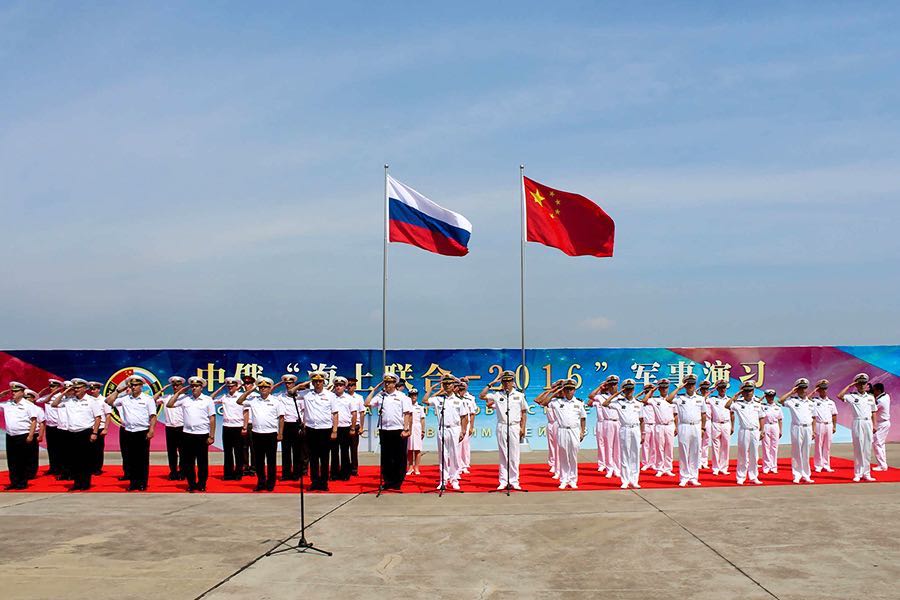 Joined Chinese-Russian military exercises in 2016 (picture Russian Ministry of Defense)
Joined Chinese-Russian military exercises in 2016 (picture Russian Ministry of Defense)
Behind these cautious remarks, Liik found a fundamental uneasiness about Russia's position in the world: 'I came to understand that [countries’] initiatives are motivated by egoistic considerations and there are no universal rules. For as long as free trade benefited the US, it was a universal virtue – but, as soon as it started benefiting the US less, it was less good,' Liik quotes an interviewee born in 1979. 'I realised that there is no altruism, no one gives Russia anything just like that, and the so-called rules-based international order is, in fact, US hegemony. It became fully evident to me only quite recently – once the hegemony started crumbling and the US started doing things they had always criticised. Then they started tweaking their policies towards weakening China – without China having annexed anything or shot down any aeroplanes.'
Treated as a loser
Many feel that the West has treated Russia as 'a second-rate country, a loser, whose experience and views have no worth', found Liik.
'We thought that [the collapse of the USSR] was our joint victory over communism,' says a young diplomat. 'But then the West said: ‘You lost.’ And, at the bottom of our souls, we actually understand it: we won ourselves, but we lost to the West. But, as we do not admit it publicly, a problem arises which affects the basics of the relationship.'
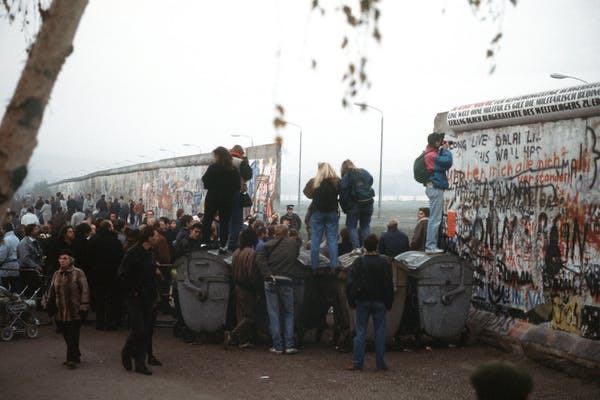 After the Fall of the Berlin Wall in 1989, the Russians felt humiliated and abandoned by the West (picture US State Department)
After the Fall of the Berlin Wall in 1989, the Russians felt humiliated and abandoned by the West (picture US State Department)
Students see the West as Russophobic and it doesn't have any empathy towards the Russian people. 'They said: We’ll punish you for what your leader has done,' an interviewee born in 1991 said to Liik. 'It puzzles me that there is no compassion … The West has lost curiosity towards us – where I’d expect questions, I do not get them, I get accusations instead. Or people wink that "Yes, yes, you are a Russian, what can you say?" That offends, though some in Russia are happy – they can now say that we have always told you [that] Westerners are Russophobes.'
Few true Putinists
Kadri Liik didn't find many true Putinists amongst the students. 'I have never voted for him,' admitted a diplomat who sounded hawkish on the West. Yet this doesn't necessarily mean that the ideals and relationship of the 1990s will return after his departure. 'Maybe it is time for the West to realise that it is not that Putin is bad, but that [Boris] Yeltsin was an exception,' suggested one young diplomat mildly.
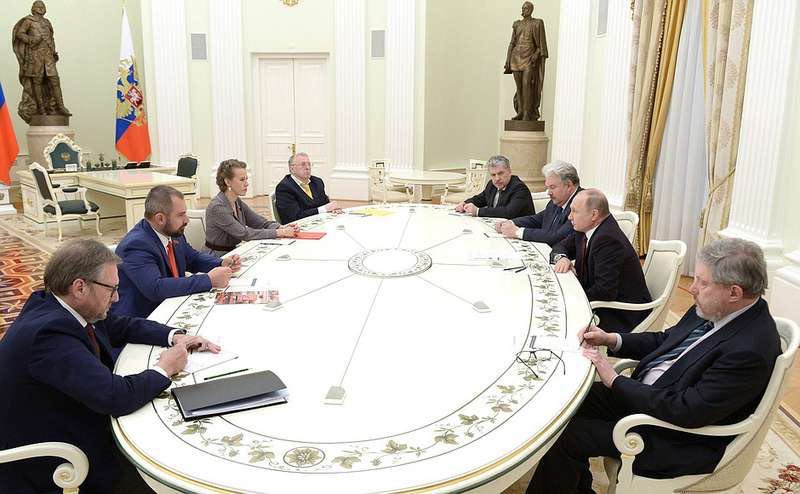 After his re-election in 2018, Putin received his 'competitors' at the Kremlin to thank them for their participation in the elections (picture Kremlin.ru)
After his re-election in 2018, Putin received his 'competitors' at the Kremlin to thank them for their participation in the elections (picture Kremlin.ru)
Those who now work in state institutions observe a state of inertia and stagnation; for many of them, ‘waiting it out’ has become a survival strategy. 'Right now, everyone is tired,' said one interviewee working at the Ministry of Foreign Affairs, born in 1992. 'The people who are in power too. The regime cannot renew, thus it freezes itself – and, in these conditions, it is quite useless to try to explain or propose anything to anyone. Better to be silent.'
No missionaries...
The young usually do not believe in ‘missions’: 'One’s conclusions and policy proposals need to correspond to the passport in one’s pocket,' said a source born in 1973. 'Because, otherwise, you benefit other passports – there is no vacuum in between. Where exactly is the line between constructive criticism and getting viewed as having gone over to the other side? Better not to take the risk. I have my reputation, after all.'
'I have become cautious about public enthusiasm,' admits a source who remembers the 1980s. 'That spark we had back then did not end well … So, I do not believe in public protest.' The same skepticism and suspicions that big public campaigns may have 'hidden beneficiaries with secret agendas', Liik noticed with those who were children during perestroika but remember the oligarch-funded media campaigns of the 1990s, that secured the re-election of Boris Yeltsin in 1996.
Another interesting conclusion in Liiks paper is that young Russians, who have been exposed to forceful propaganda, don't believe what they are told, but 'become highly critical, and distrustful, of any messages they cannot independently verify. In this way, disillusionment with the 1990s is also translating into how the young generation relates to the authorities, as well as protest.'
...but in favour of a strong leader
Students of Moscow State Institute of International Relations (MGIMO) are not shaped by the disappointment of the 1990s or the fatigue of the present day, but still, they favour greater authoritarianism. The focus groups agreed that Russia needs 'a strong leader', and some even suggested that the presidential term should be extended to 10, 12, or 15 years.
[The president] 'can watch the rotation of governments and elected parliaments, but he will be the person who will steer the country’s direction, so as to avoid sudden changes,' said one participant. 'For a country where there has always been one person at the top, it should stay like this: one person at the top,' said another.
Liik found a 'remarkable bleakness about the state of the country under Putin, but also about those who criticise the country, whether from within or without'.
Erosion of authority
Annexing Crimea may have given Putin a huge popularity boost in society at large but 'it may also have eroded his authority among civil servants'. 'Many people’s faith in the leadership suffered a blow,' confirms one well-connected analyst. '[Putin] spoke one thing, and then did another.' Even in the eyes of loyalists, 'Crimea' is the same example from 'politicians diverging from expertise' as the Trump presidency and Brexit. 'Since 2014, the words of politicians [have lacked] content. They do not listen to specialist opinions. All these cases from Crimea to Brexit are part of the same phenomenon,' a young diplomat confided to Liik.
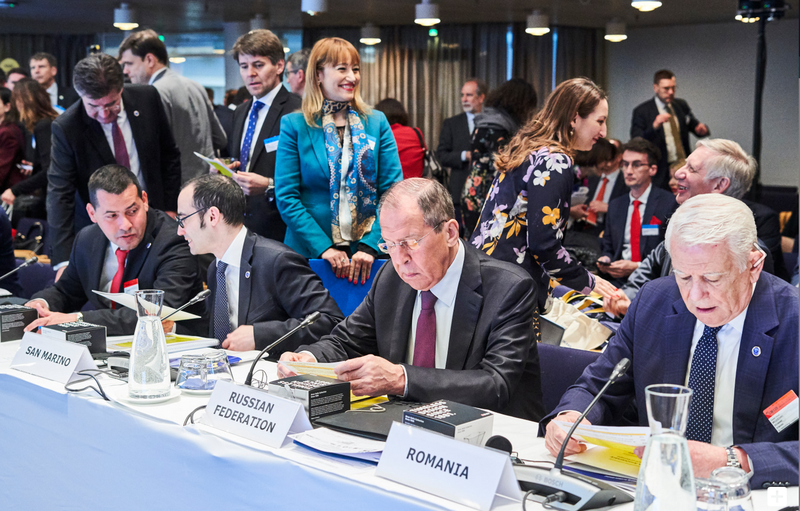 Minister of Foreign Affairs Sergey Lavrov in Helsinki in may 2018: role of his ministry is declining
Minister of Foreign Affairs Sergey Lavrov in Helsinki in may 2018: role of his ministry is declining
The annexation of Crimea has changed the climate at the Russian Ministry of Foreign Affairs, people tell. 'It is impossible to discuss the return of Crimea – it is a criminal offence,' confides an analyst working with the ministry. 'And that makes discussions very different from what they were like at the turn of the century, when everything could be discussed.'
Foreign policy is militarising
Since 2014 the role of the Ministry of Foreign Affairs is diminishing, whereas the Presidential Administration, its security council, the secret services and the Ministry of Defense are increasingly prominent. 'Foreign policy is militarising,' said an expert working with the ministry. 'Right now, there is a demand for soldier-diplomats rather than problem-solvers – for propagandists rather than empathetic minds.'
Worries of the Fathers of Diplomacy
Older geopoliticists like Fyodor Lukyanov, the 52-year-old chair of the Council on Foreign and Defence Policy, are worried about the pragmatism they encounter in the younger generation. 'The young lack a strategic mindset,' Lukyanov said to Liik. 'They approach issues on a case-by-case basis, with no overarching concepts.' That would be fine, he added, 'if there was no feeling that a big crisis is on the horizon'. In fact, the fragility of big narratives might be something that unites the Russian youth with their peers in the West.
This pragmatism can be found even in 'young' topics like ecology, climate change, and gender issues. It is taken as 'pure realpolitik, with no traces of idealistic environmental activism. A “green wave” of the sort seen in this year’s European Parliament election would be impossible in today’s Russia,' says Liik. On feminism, one student said, only half-jokingly: 'Russia is a country of winning post-feminism, and that forms part of its soft power'.
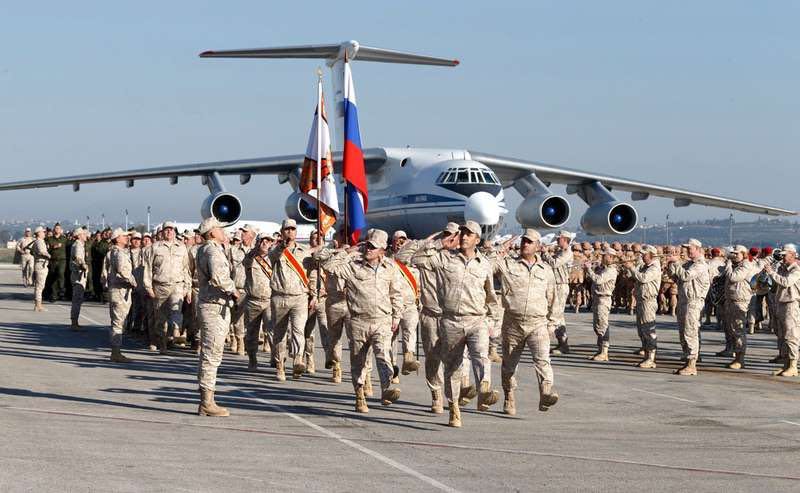 Russian troups at Khmeimim-base in Syria during Putin's visit in 2017 (picture Ministry of Defense)
Russian troups at Khmeimim-base in Syria during Putin's visit in 2017 (picture Ministry of Defense)
With some alarm Moscow's foreign establishment sees a growing number of 'ambitious provincials' among the ranks of young diplomats, who are driven mainly by careerism and the burning desire to escape to the capital or abroad. This could lead to 'uncritical and opportunistic loyalty to the Kremlin’s questionable policy ideas', some muse.
'I have an MGIMO friend who comes from a Siberian village called N—,' says an interlocutor born in 1989. 'And he says that he would do anything in order not to go back there: "If I’m asked to say that Crimea is Russian, I say it is Russian. If I need to say Crimea is Mongolian – fine, it is Mongolian! Only not back to N—.”
Kadri Liik: 'In the minds of many of Russia’s future power brokers, the world to come is a bleakly realist one that is of a piece with a maxim attributed to Alexander III: Russia’s only true allies are its army and navy. For the youngest Russian entrants into the world of diplomacy, the West is but one power in the world. It has not “offended” them, so there is little in the way of disillusionment with it. But, perhaps because of this and the young generation’s aversion to ideology and close scrutiny of conventional truths, there may be more opportunities for the two sides to become partners in the future – working together to protect their own interests in a pragmatic way.'
Conclusions:
- Russia’s new generation of foreign policy professionals brings with them a shift in attitudes that challenges the centrality of 'the West' in Russian foreign policy.
- Today’s young professionals are often bitterly affected by 'disillusionment' with the West, but the youngest of them – people in their 20s – are free of such emotion, harbouring an outlook that is sharply realist and pragmatic.
- Russia’s young foreign policy professionals are neither Putin loyalists nor Western-style liberals: they are wary of ready-made ideologies and prefer to attend to their own consciences.
- Young diplomats’ ability to shape policy will depend on the balance of power between ‘civilian’ and ‘power’ ministries in Russia (such as, respectively, the foreign and defense ministries), with the former in retreat lately.
- These shifts mean the West should not hold out hope for the optimism of the 1990s to return once Putin departs.
Here you can read the policy paper in full.
